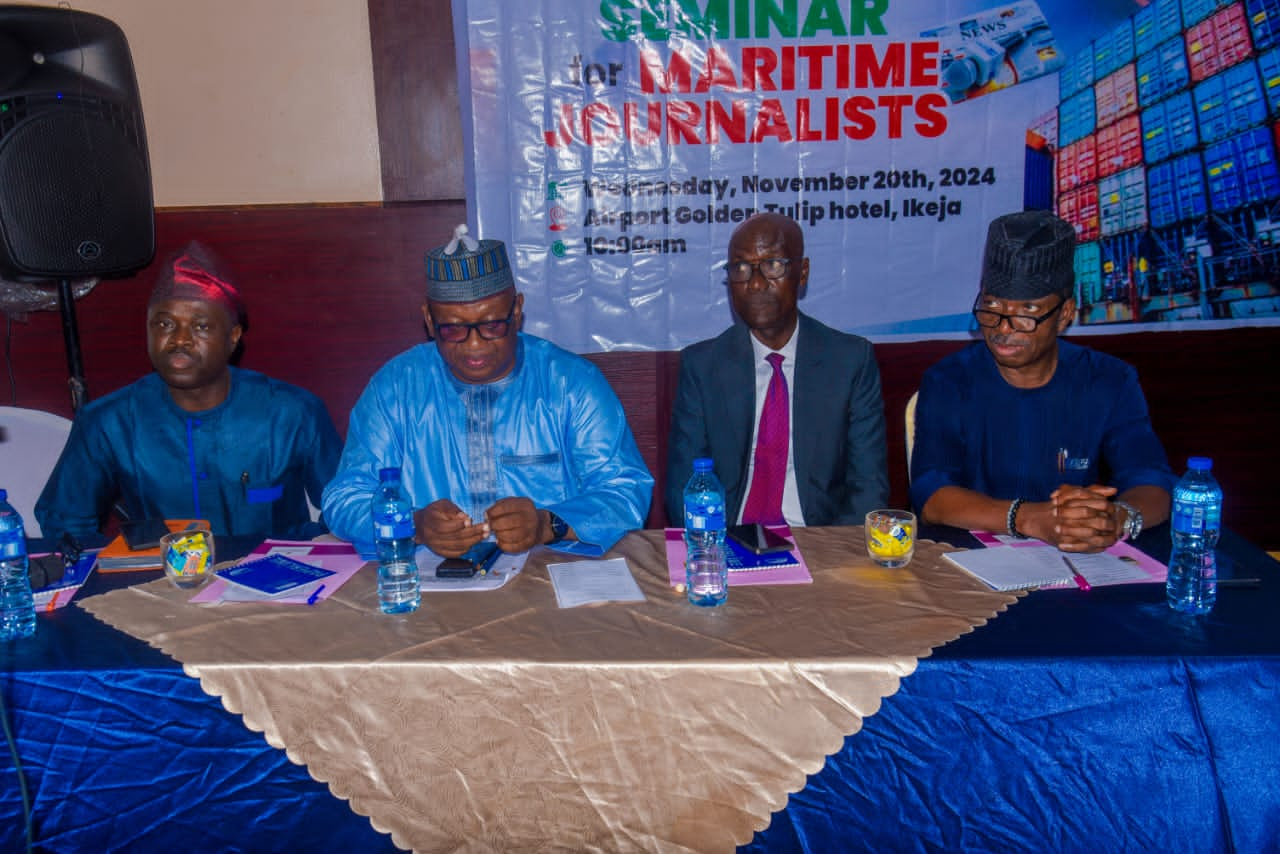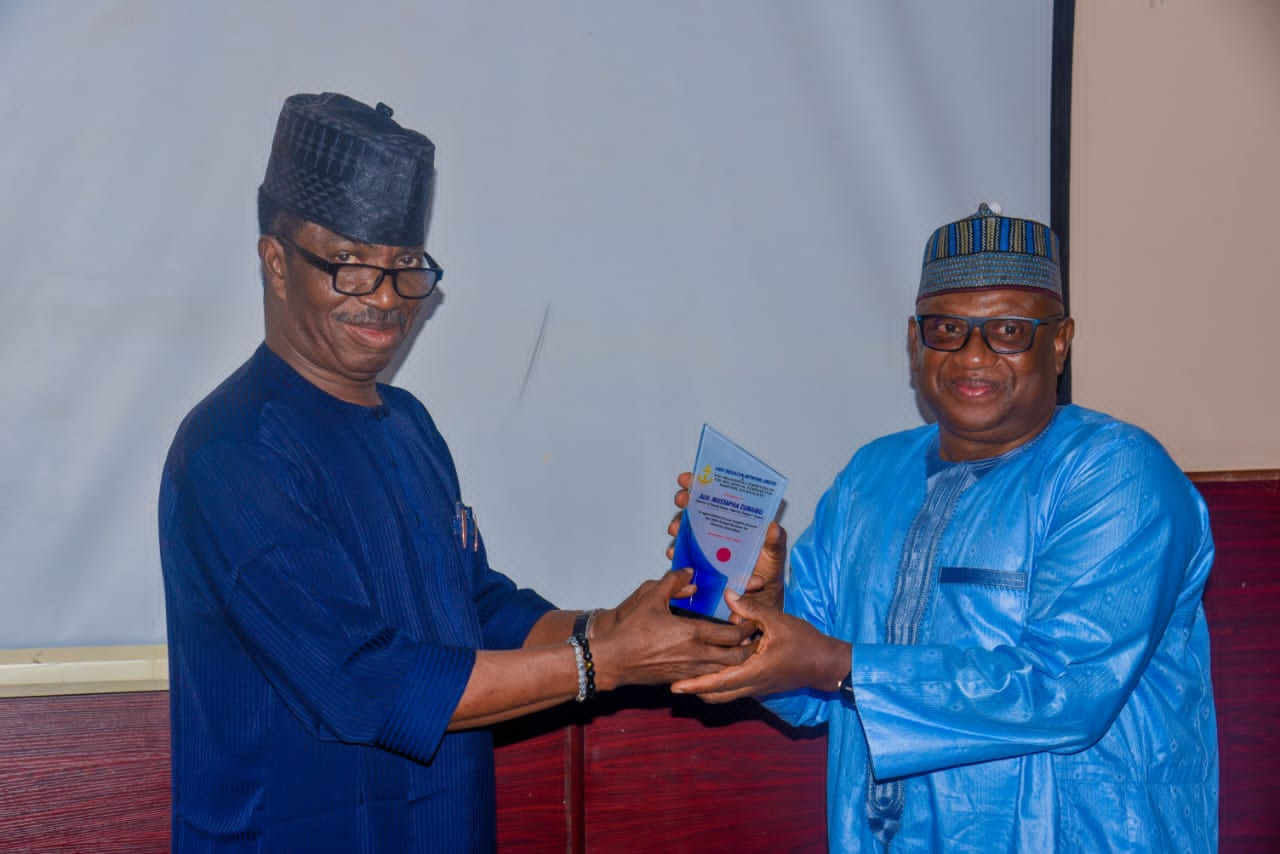
The Nigerian Shippers’ Council (NSC) has proposed a new bill aimed at addressing the ongoing challenges in the country’s maritime sector, particularly the reluctance of shipping lines to send imported containers to Inland Container Depots (ICDs) across Nigeria.
The bill, titled “The Carriage of Goods by Land, Sea, and Rail”, has already been submitted to the National Assembly and is expected to provide solutions to improve coordination and enhance the utilization of dry ports.
Speaking during the 2024 Seminar for Maritime Journalists in Lagos on Wednesday, NSC Executive Secretary, Barr Pius Ukeyima Akutah, revealed that a proposed bill, titled “The Carriage of Goods by Land, Sea, and Rail,” has been submitted to the National Assembly to address these issues.
The bill, according to Akutah, is intended to provide a framework that ensures effective coordination between shipping lines, port operators, and dry ports across Nigeria. Once passed, it will address the reluctance of shipping companies to extend their services to inland destinations, a practice that has rendered many dry ports underutilized.
The 2024 seminar, themed “The Nigerian Shippers Council in Transition: Issues, Prospects, and Challenges,” brought together key stakeholders, including industry experts, maritime journalists, and government representatives.
Akutah who was represented by the Director of Special Duties, Mr. Mustapha Zubairu pointed out the crucial role of indigenous shipping companies in driving the economy, urging the government to continue fostering an environment that protects local jobs and investments.
“There is a need for a regulatory framework to protect and encourage indigenous participation in the maritime sector, shipping lines must not be allowed to monopolize this critical industry. We must create policies that enable our local operators to thrive.” said Akutah.
Further discussing the challenges, the Deputy Director of Monitoring and Enforcement at NSC, Mr. Sarumi Adesina, identified issues such as container deposit refunds as key reasons for the reluctance of shipping companies to use inland depots. He explained that the industry has been grappling with unethical practices, particularly involving freight forwarders who fail to return containers, leading to significant losses for shipping companies.

In response, NSC is exploring an insurance-backed initiative to underwrite container deposit refunds, offering consignees the option to pay a minimal service charge instead of large deposits. This approach, Adesina noted, would provide a win-win solution for both shipping companies and consignees, ensuring the return of containers and a smooth operation of the system.
In addition to these measures, Akutah and other stakeholders emphasized the need for policies that support local investors, especially in the face of foreign dominance in certain aspects of the industry.
Speaking during his keynote address, CEO of the Centre for the Promotion of Private Enterprise (CPPE) Dr. Muda Yusuf called for stronger coordination and policy frameworks to protect jobs in Nigeria’s maritime sector and encourage the growth of indigenous investments.
Dr Yusuf, who chaired the event made the remarks while addressing critical challenges facing the sector, particularly the growing dominance of foreign players and policies that undermine local capacity.
He emphasized the need for a regulatory framework similar to that of the Nigerian Communications Commission (NCC), which, he noted, effectively curbs unregulated practices by telecom companies. He called for the same level of regulation in the maritime sector, especially in light of issues such as the under-reporting of the maritime sector’s contribution to the nation’s GDP.
According to Dr Yusuf, the Nigerian Bureau of Statistics (NBS) frequently reports the sector’s contribution as minimal, with water transportation alone receiving marginal acknowledgment.
Yusuf pointed out that “the maritime sector is far beyond just water transportation, we need policies that protect local operators, who are losing jobs daily, and that promote the sustainable development of this critical sector.”
Yusuf further advocated for increased support for indigenous shipping companies, stressing that the country’s domestic shipping capacity should be prioritized. “We must ensure that indigenous companies can fully participate in maritime activities, from cargo clearance to shipping operations,” he said, calling attention to the Cabotage Law, which he believes plays a vital role in protecting local players.
He also criticized certain domestic policies that he argued discourage local participation, particularly those related to exchange rates and customs duties. “The use of fluctuating exchange rates in the computation of import duties has contributed to the high costs of goods and weakened local businesses,” he said. “Policies must be reviewed to make them conducive for the growth of the local economy and maritime sector.”
Asserting that there should be a deliberate effort to support local investors, Yusuf appealed to maritime journalists to elevate the conversation around these issues and to focus on policies that foster domestic participation and protect jobs. He emphasized that for Nigeria’s economy to thrive, its citizens must play a central role in its industrial development.
Yusuf concluded his address by reiterating the importance of strengthening the regulatory framework of the maritime sector. He urged all stakeholders, including government bodies and industry players, to work together to ensure the protection of local industries and the creation of an enabling environment for Nigerian businesses.
The Chief Executive Officer of First Mediacon Network Limited and facilitator of the seminar, Mr Sesan Onileimo praised the NSC for sustaining the event, which has become a key initiative for capacity building among maritime journalists.
Reflecting on the seminar’s origins, Onileimo recalled the proposal made nine years ago to hold a gathering specifically for maritime journalists. He expressed gratitude to the past and current management of the NSC for their support of the project.
“The seminar has now become one of the Key Performance Indicators (KPIs) for the PR Department of the NSC, and we are pleased to see it grow every year,” Onileimo said.
The 2024 Seminar for Maritime Journalists highlighted key issues affecting the Nigerian maritime sector, focusing on enhancing regulatory standards, improving infrastructure, and protecting jobs within the industry. The NSC’s proactive efforts are aimed at creating a more inclusive and efficient maritime environment, ensuring that local players can compete effectively in the global marketplace.















